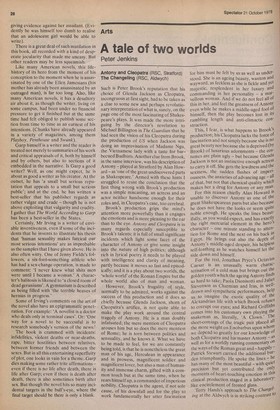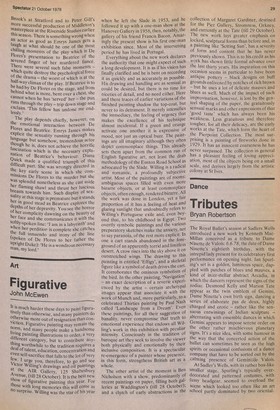Arts
A tale of two worlds
Peter Jenkins
Antony and Cleopatra (RSC, Stratford) The Changeling (RSC, Aldwych) Such is Peter Brook's reputation that his choice of Glenda Jackson as Cleopatra, incongruous at first sight, had to be taken as a clue to some new and perhaps revolutionary interpretation of what is, surely, on the page one of the most fascinating of Shakespeare's plays. It was made the more intriguing by the director's revelation to Michael Billington in The Guardian that he had seen the vision of his Cleopatra during the production of US when Jackson was doing an improvisation of Madame Ngu, the Vietnamese lady with a taste for bar. becued Budhists. Another clue from Brook, in the same interview, was his description of Antony — played at Stratford by Alan Howard — as 'one of the great undiscovered parts in Shakespeare.' Armed with these hints I struggled to resist the conclusion that the first thing wrong with Brook's production was a simple miscasting, an actress and an actor neither handsome enough for their roles and, in Cleopatra's case, too cerebral.
Brook's production grips the mind's attention more powerfully than it engages the emotions and is more pleasing to the ear than to the eye. Antony and Cleopatra is in many regards especially susceptible to Brook's talents: it is full of small significant incidents which light some facet of the character of Antony or give some insight into the nature of high politics; although rich in lyrical poetry it needs to be played with intelligence and clarity of meaning, partly because it moves so fast and episodically; and it is a play about two worlds, the 'whole world' of the Roman Empire but the whole world also of man and woman.
However, Brook's frugality of style, normally to be admired, works against the success of this production and it does so chiefly because Glenda Jackson, shorn of Cleopatra's artifice, is not quite able to make the play work around the central tragedy of Antony. He is a man doubly infatuated; the mere mention of Cleopatra arouses him but so does the mere mention of Rome; he is torn between politics and sensuality, and he knows it. What we have to be made to feel, for we are constantly being told, is that he is nonetheless the great man of his age, Herculean in appearance and in prowess, magnificent soldier and magnificent lover, but also a man of humanity and immense charm, gifted with a common touch but at the same time, when he rears himself up, a commander of imperious nobility. Cleopatra is the agent, if not sole cause, of his downfall and for the play to work fundamentally her utter fascination for him must be felt by us-as well as understood. She is an ageing beauty, wanton and wayward, as feckless as she is fickle and yet majestic, resplendent in her luxury and commanding in her personality — a marvellous woman. And if we do not feel all of this in her, and feel the greatness of Antony even while he makes a middle-aged fool of himself, then the play becomes lost in its rambling length and anti-climactic construction. This, I fear, is what happens to Brook's. production; his Cleopatra lacks the force of fascination and not simply because she is no great beauty nor because she is deprived (by Brook) of luxurious adornments — the costumes are plain ugly — but because Glenda Jackson is not an instinctive enough actress to carry it off. She gets the lewdness and the sexiness, the sudden flashes of imperiousness, the anxieties of advancing age — all of that, but not that chemical quality which makes her a drug for Antony or any mail. For this reason chiefly Alan Howard is unable to discover Antony as one of the great Shakespearean parts but also because he does not have the looks or seem quite noble enough. He speaks the lines beautifully, as you would expect, and has exactly the right mercurial element in the hero s character — one minute standing to attention for Rome and the next on his back 01 EgyptHe brings out also the depth of Antony's middle-aged despair, his helpless self-loathing as he watches himself let the side down and himself.
For the rest, Jonathan Pryce's Octavius Caesar is an unusually warm characterisation of a cold man but brings out the golden youth which the ageing Antony finds so hard to take; Paola Dionisotti and Juliet Stevenson as Charmian and Iras, in well drawn and sympathetic performances, help us to imagine the exotic quality of the Alexandrian life with which Brook refuses to corrupt our eyes; and Richard Griffiths comes into his customary own playing the snakeman as, literally, 'A Clown.' The short-comings of the tragic pair placed all the more weight on Enobarbus upon whom we depend so greatly for our knowledge of both Cleopatra and his master Antony — as well as for a worldly running commentary ori the ways of the Roman great and — happilY — Patrick Stewart carried the additional bur den triumphantly. He spoke the lines — he has many of the most beautiful — with quiet precision but yet contributed the only moments of heart-touching emotion in this clinical production staged in a laboratory like encirclement of frosted glass. Terry Hands's approach to The Changeling at the Aldwych is in striking contrast to Brook's at Stratford and to Peter Gill's more successful production of Middleton's masterpiece at the Riverside Studios earlier chilling moments of the play which is De an actor as good as Emrys James gets a laugh at what should be one of the most Flores's presentation to Beatrice of the this season. There is something wrong when severed finger of her murdered fiance. There were several such false moments — Which quite destroy the psychological force of the drama — the worst of which is at the half-way climax of the play. If Beatrice is to be had by De Flores on the stage, and from behind what is more, bent over a chest, she cannot when he has 'served' her — the pun runs through the play — trip down stage and exclaim lessly.' 'This fellow has undone me end The play depends chiefly, however, on the emotional interaction between De Flores and Beatrice. Emrys James makes explicit the sexuality running through his language but somehow, tremendous actor though he is, does not achieve the horrific fascination which is the necessary explanation of Beatrice's behaviour. Diana Quick made a qualified triumph of this difficult part. She was wrongly directed in the key early scene in which she commissions De Flores to the murder but she was splendid nonetheless as she cast aside her flaming shawl and thrust her luscious breasts towards him. Such display of sexuality at this stage is premature but it stands her in good stead as Beatrice explores the depths of her depravity. You see the horror of her complicity dawning on the beauty of her face and she communicates it with the softlY-spoken line: 'I am in a labyrinth' and When her perditior is complete she catches the full innuendo and irony of the line (spoken of De Flores to her father the Upright Duke): 'He is a wondrous necessary man, my lord.'







































 Previous page
Previous page